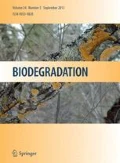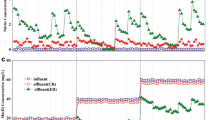Abstract
Carbon-based materials have been shown to enhance anaerobic digestion processes by promoting direct interspecies electron transfer in methanogenic consortia. However, little is known on their effects during the treatment of complex substrates, such as those derived from protein-rich wastewaters. Here, organic xerogels (OX) are tested, for the first time, as accelerators of the methanogenic activity of an anaerobic consortium treating a synthetic protein-rich wastewater. Three OX with distinct pore size distribution (10 and 1000 nm for OX-10 and OX-1000, respectively) and structural conformation (graphene oxide integration into OX-10-GO polymeric matrix) were synthesized. OX-1000 promoted the highest methane production rate (5.21 mL/g*h, 13.5% increase with respect to the control incubated without OX) among the synthesized OX. Additionally, batch bioreactors amended with OX achieved higher chemical oxygen demand (COD) removal (up to 88%) as compared to the control, which only showed 50% of COD removal. Interestingly, amendment of bioreactors with OX also triggered the production of medium-chain fatty acids, including caprylate and caproate. Moreover, OX decreased the accumulation of ammonium, derived from proteins hydrolysis, partly explained by their adsorption capacities, and probably involving their electron-accepting capacity promoting anaerobic ammonium oxidation. This is the first time that OX were successfully applied as methanogenic accelerators for the anaerobic treatment of synthetic protein-rich wastewater, increasing the methane production rate and COD removal as well as triggering the production of medium chain fatty acids and attenuating the accumulation of ammonium. Therefore, OX are proposed as suitable materials to boost the efficiency of anaerobic systems to treat complex industrial wastewaters.






Similar content being viewed by others
References
Alonso-Buenaposada ID, Calvo EG, Montes-Morán MA, Narciso J, Menéndez JA, Arenillas A (2016) Desiccant capability of organic xerogels: surface chemistry vs porous texture. Microporous Mesoporous Mat 232:70–76. https://doi.org/10.1016/j.micromeso.2016.06.007
Alonso-Buenaposada ID, Arenillas A, Montes-Morán MA, Menéndez JA (2017) Superhydrophobic and breathable resorcinol-formaldehyde Xerogels. J Non-Cryst Solids 471:202–208. https://doi.org/10.1016/j.jnoncrysol.2017.05.039
Amezquita-Garcia HJ, Rangel-Mendez JR, Cervantes FJ, Razo-Flores E (2016) Activated carbon fibers with redox-active functionalities improves the continuous anaerobic biotransformation of 4-nitrophenol. Chem Eng J 286:208–215. https://doi.org/10.1016/j.cej.2015.10.085
Angelidaki I, Alves M, Bolzonella D, Borzacconi L, Campos JL, Guwy AJ, Kalyuzhnyi S, Jenicek P, Van Lier JB (2009) Defining the biomethane potential (BMP) of solid organic wastes and energy crops: a proposed protocol for batch assays. Water Sci Technol 59:927–934. https://doi.org/10.2166/wst.2009.040
Baird RB, Eaton AD, Rice EW (2017) Standard Methods for the Examination of Water and Wastewater, 23rd Edition. American Public Health Association (APHA), American Water Works Association (AWWA), Water Environment Federation (WEF), United States. https://doi.org/10.1016/B978-0-12-382165-2.00237-3
Bueno-López JI, Rangel-Mendez JR, Alatriste-Mondragón F, Pérez-Rodríguez F, Hernández-Montoya V, Cervantes FJ (2018) Graphene oxide triggers mass transfer limitations on the methanogenic activity of an anaerobic consortium with a particulate substrate. Chemosphere 211:709–716. https://doi.org/10.1016/j.chemosphere.2018.08.001
Calvo EG, Juárez-Pérez EJ, Menéndez JA, Arenillas A (2011) Fast microwave-assisted synthesis of tailored mesoporous carbon xerogels. J Coll Interface Sci 357:541–547. https://doi.org/10.1016/j.jcis.2011.02.034
Canal-Rodríguez M, Arenillas A, Rey-Raap N, Ramos-Fernández G, Martín-Gullón I, Menéndez JA (2017) Graphene-doped carbon xerogel combining high electrical conductivity and surface area for optimized aqueous supercapacitors. Carbon 118:291–298. https://doi.org/10.1016/j.carbon.2017.03.059
Chen S, Rotaru AE, Shrestha PM, Malvankar NS, Liu F, Fan W, Nevin KP, Lovley DR (2014) Promoting interspecies electron transfer with biochar. Sci Rep 4:5019. https://doi.org/10.1038/srep05019
Cuadrado-Collados C, Farrando-Pérez J, Martínez-Escandell M, Ramírez-Montoya LA, Menéndez JA, Arenillas A, Montes-Morán MA, Silvestre-Albero J (2020) Well-defined meso/macroporous materials as a host structure for methane hydrate formation: organic versus carbon xerogels. Chem Eng J 402:126276. https://doi.org/10.1016/j.cej.2020.126276
Dang Y, Sun D, Woodard TL, Wang LY, Nevin KP, Holmes DE (2017) Stimulation of the anaerobic digestion of the dry organic fraction of municipal solid waste (OFMSW) with carbon-based conductive materials. Bioresour Technol 238:30–38. https://doi.org/10.1016/j.biortech.2017.04.021
De Velasco-Maldonado PS, Pat-Espadas AM, Cházaro-Ruíz LF, Cervantes FJ, Hernández-Montoya V (2019) Cold oxygen plasma induces changes on the surface of carbon materials enhancing methanogenesis and N2O reduction in anaerobic sludge incubations. J Chem Technol Biotechnol 94:3367–3374. https://doi.org/10.1002/jctb.6149
Duong TH, Grolle K, Nga TTV, Zeeman G, Temmink H, Van Eekert M (2019) Protein hydrolysis and fermentation under methanogenic and acidifying conditions. Biotechnol Biofuels 12:1–10. https://doi.org/10.1186/s13068-019-1592-7
Flores-López SL, Ramírez-Montoya LA, Casal MD, Montes-Morán MA, Menéndez JA, Arenillas A (2021) Tortuosity of the porous structure of carbon gels. Carbon 171:921–930. https://doi.org/10.1016/j.carbon.2020.09.079
Fujinawa K, Nagoya M, Kouzuma A, Watanabe K (2019) Conductive carbon nanoparticles inhibit methanogens and stabilize hydrogen production in microbial electrolysis cells. Appl Microbiol Biotechnol 103:6385–6392. https://doi.org/10.1007/s00253-019-09946-1
Lee JY, Lee SH, Park HD (2016) Enrichment of specific electro-active microorganisms and enhancement of methane production by adding granular activated carbon in anaerobic reactors. Bioresour Technol 205:205–212. https://doi.org/10.1016/j.biortech.2016.01.054
Li H, Chang J, Liu P, Fu L, Ding D, Lu Y (2015) Direct interspecies electron transfer accelerates syntrophic oxidation of butyrate in paddy soil enrichments. Environ Microbiol 17:1533–1547. https://doi.org/10.1111/1462-2920.12576
Liu B, Kleinsteuber S, Centler F, Harms H, Sträuber H (2020) Competition between butyrate fermenters and chain-elongating bacteria limits the efficiency of medium-chain carboxylate production. Front Microbiol 11:1–13. https://doi.org/10.3389/fmicb.2020.00336
Luo C, Lü F, Shao L, He P (2015) Application of eco-compatible biochar in anaerobic digestion to relieve acid stress and promote the selective colonization of functional microbes. Water Res 68:710–718. https://doi.org/10.1016/j.watres.2014.10.052
Ma J, Amjad Bashir M, Pan J, Qiu L, Liu H, Zhai L, Rehim A (2018) Enhancing performance and stability of anaerobic digestion of chicken manure using thermally modified bentonite. J Clean Prod 183:11–19. https://doi.org/10.1016/j.jclepro.2018.02.121
Marbán G, Ramírez-Montoya LA, García H, Menéndez JA, Arenillas A, Montes-Morán MA (2018) Load-dependent surface diffusion model for analyzing the kinetics of protein adsorption onto mesoporous materials. J Coll Interface Sci 511:27–38. https://doi.org/10.1016/j.jcis.2017.09.091
Martins G, Salvador AF, Pereira L, Alves MM (2018) Methane production and conductive materials: a critical review. Environ Sci Technol 52:10241–10253. https://doi.org/10.1021/acs.est.8b01913
Menéndez JA, Illán-Gómez MJ, León CA, Radovic LR (1995) On the difference between the isoelectric point and the point of zero charge of carbons. Carbon 33:1655–1657. https://doi.org/10.1016/0008-6223(95)96817-R
Park JH, Kang HJ, Park KH, Park HD (2018) Direct interspecies electron transfer via conductive materials: a perspective for anaerobic digestion applications. Bioresour Technol 254:300–311. https://doi.org/10.1016/j.biortech.2018.01.095
Rey-Raap N, Angel Menéndez J, Arenillas A (2014) RF xerogels with tailored porosity over the entire nanoscale. Microporous Mesoporous Mater 195:266–275. https://doi.org/10.1016/j.micromeso.2014.04.048
Rey-Raap N, Szczurek A, Fierro V et al (2015) Towards a feasible and scalable production of bio-xerogels. J Coll Interface Sci 456:138–144. https://doi.org/10.1016/j.jcis.2015.06.024
Rey-Raap N, Calvo EG, Menéndez JA, Arenillas A (2017) Exploring the potential of resorcinol-formaldehyde xerogels as thermal insulators. Microporous Mesoporous Mater 244:50–54. https://doi.org/10.1016/j.micromeso.2017.02.044
Rios-Del Toro EE, Valenzuela EI, Ramírez JE, López-Lozano NE, Cervantes FJ (2018) Anaerobic ammonium oxidation linked to microbial reduction of natural organic matter in marine sediments. Environ Sci Technol Lett 5:571–577. https://doi.org/10.1021/acs.estlett.8b00330
Shaw DR, Ali M, Katuri KP, Gralnick JA, Reimann J, Mesman R, van Niftrik L, Jetten MSM, Saikaly PE (2020) Extracellular electron transfer-dependent anaerobic oxidation of ammonium by anammox bacteria. Nat Commun 11:1–12. https://doi.org/10.1038/s41467-020-16016-y
Shen Y, Yu Y, Zhang Y, Urgun-Demirtas M, Yuan H, Zhu N, Dai X (2021) Role of redox-active biochar with distinctive electrochemical properties to promote methane production in anaerobic digestion of waste activated sludge. J Clean Prod 278:123212. https://doi.org/10.1016/j.jclepro.2020.123212
Stams AJM, Plugge CM (2009) Electron transfer in syntrophic communities of anaerobic bacteria and archaea. Nat Rev Microbiol 7:568–577. https://doi.org/10.1038/nrmicro2166
Su C, Zhao L, Liao L, Qin J, Lu Y, Deng Q, Chen M, Huang Z (2019) Application of biochar in a CIC reactor to relieve ammonia nitrogen stress and promote microbial community during food waste treatment. J Clean Prod 209:353–362. https://doi.org/10.1016/j.jclepro.2018.10.269
Ubukata Y (1998) Kinetics and fundamental mechanisms of protein removal by activated sludge: hydrolysis of peptone to amino acids is the rate-determining step. Water Sci Technol 38:121–128. https://doi.org/10.2166/wst.1998.0798
Vázquez JA, Murado MA (2008) Enzymatic hydrolysates from food wastewater as a source of peptones for lactic acid bacteria productions. Enzyme Microb Technol 43:66–72. https://doi.org/10.1016/j.enzmictec.2008.01.015
Villegas-Rodríguez S, Buitrón G (2021) Performance of native open cultures (winery effluents, ruminal fluid, anaerobic sludge and digestate) for medium-chain carboxylic acid production using ethanol and acetate. J Water Process Eng 40:101784. https://doi.org/10.1016/j.jwpe.2020.101784
Wang T, Zhang D, Dai L, Chen Y, Dai X (2016) Effects of metal nanoparticles on methane production from waste-activated sludge and microorganism community shift in anaerobic granular sludge. Sci Rep 6:1–10. https://doi.org/10.1038/srep25857
Wu Y, Wang S, Liang D, Li N (2020) Conductive materials in anaerobic digestion: from mechanism to application. Bioresour Technol 298:122403. https://doi.org/10.1016/j.biortech.2019.122403
Xu S, He C, Luo L, Lü F, He P, Cui L (2015) Comparing activated carbon of different particle sizes on enhancing methane generation in upflow anaerobic digester. Bioresour Technol 196:606–612. https://doi.org/10.1016/j.biortech.2015.08.018
Xu H, Wang C, Yan K, Wu J, Zuo J, Wang K (2016) Anaerobic granule-based biofilms formation reduces propionate accumulation under high H2 partial pressure using conductive carbon felt particles. Bioresour Technol 216:677–683. https://doi.org/10.1016/j.biortech.2016.06.010
Yuan HY, Ding LJ, Zama EF, Liu PP, Hozzein WN, Zhu YG (2018) Biochar modulates methanogenesis through electron syntrophy of microorganisms with ethanol as a substrate. Environ Sci Technol 52:12198–12207. https://doi.org/10.1021/acs.est.8b04121
Zhang S, Chang J, Lin C, Pan Y, Cui K, Zhang X, Liang P, Huang X (2017) Enhancement of methanogenesis via direct interspecies electron transfer between Geobacteraceae and Methanosaetaceae conducted by granular activated carbon. Bioresour Technol 245:132–137. https://doi.org/10.1016/j.biortech.2017.08.111
Zhang J, Zhao W, Zhang H, Wang Z, Fan C, Zang L (2018) Recent achievements in enhancing anaerobic digestion with carbon-based functional materials. Bioresour Technol 266:555–567. https://doi.org/10.1016/j.biortech.2018.07.076
Zhao Z, Li Y, Quan X, Zhang Y (2017a) Towards engineering application: potential mechanism for enhancing anaerobic digestion of complex organic waste with different types of conductive materials. Water Res 115:266–277. https://doi.org/10.1016/j.watres.2017.02.067
Zhao Z, Zhang Y, Li Y, Dang Y, Zhu T, Quan X (2017b) Potentially shifting from interspecies hydrogen transfer to direct interspecies electron transfer for syntrophic metabolism to resist acidic impact with conductive carbon cloth. Chem Eng J 313:10–18. https://doi.org/10.1016/j.cej.2016.11.149
Zheng H, Li D, Stanislaus MS, Zhang N, Zhu Q, Hu X, Yang Y (2015) Development of a bio-zeolite fixed-bed bioreactor for mitigating ammonia inhibition of anaerobic digestion with extremely high ammonium concentration livestock waste. Chem Eng J 280:106–114. https://doi.org/10.1016/j.cej.2015.06.024
Acknowledgements
This work was financially supported by Universidad Nacional Autónoma de México (UNAM, PAPIIT Grant TA100120). LARM acknowledges fellow from UNAM (DGAPA grant number COIC/DDTPA/064/2020). The technical assistance of Gloria Moreno-Rodríguez and Jaime Pérez-Trevilla is greatly appreciated.
Funding
Universidad Nacional Autónoma de México (UNAM, PAPIIT grant TA100120 and UNAM, DGAPA Grant Number COIC/DDTPA/064/2020).
Author information
Authors and Affiliations
Contributions
Conceptualization, FJC; visualization, LARM, FJC; formal analysis, LARM, FJC; investigation, LARM; methodology, MAMM, JRRM; validation, MAMM, JRRM; project administration, FJC; resources, FJC; writing—review and editing, LARM, FJC.
Corresponding author
Ethics declarations
Conflict of interest
The authors declare that they have no known competing financial interests or personal relationships that could have appeared to influence the work reported in this paper.
Additional information
Publisher’s note
Springer Nature remains neutral with regard to jurisdictional claims in published maps and institutional affiliations.
Supplementary Information
Below is the link to the electronic supplementary material.
Rights and permissions
About this article
Cite this article
Ramírez-Montoya, L.A., Montes-Morán, M.A., Rangel-Mendez, J.R. et al. Enhanced anaerobic treatment of synthetic protein-rich wastewater promoted by organic xerogels. Biodegradation 33, 255–265 (2022). https://doi.org/10.1007/s10532-022-09984-z
Received:
Accepted:
Published:
Issue Date:
DOI: https://doi.org/10.1007/s10532-022-09984-z




